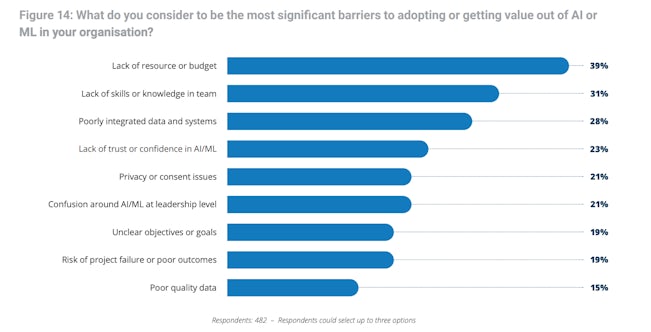Three ways intelligent automation can make smarter marketing decisions
Intelligent automation uses artificial intelligence to gain insights from big data and turn them into action. By implementing machine learning models into automated systems, programmes can crunch data, make decisions and then take action without the input of human beings.
PPC: When automation may not be the best option for retailers
Advertising platforms are offering more automation tools. However, it is important to look at the bigger picture and not always view channels in isolation. There are several key examples when automation may not be the best solution for retailers using paid search.
Nearly half of marketers are already using or testing machine learning
With more organisations showing greater understanding of how AI and machine learning can be utilised, adoption is rising.
Will coronavirus accelerate the adoption of automation in the hotel industry?
With countries around the world still in lockdown, it’s difficult to imagine a time when it is ‘business as usual’ for the hotel industry.
Four factors behind the success of Stitch Fix
Stitch Fix is an online personal styling service that sends a curated selection of clothing and accessories to customers, using a mix of machine learning and human selection.
How SEOs can benefit from using AI and automation
Today, optimizing for search is optimizing your customer’s experience. As people query a search engine on their laptop, ask a voice assistant for help, or use their mobile device to find nearby solutions to their needs, brands must be positioned to appear in these critical decision-making moments.
28% of ‘CX leaders’ are planning to invest in AI in 2020
According to Econsultancy’s Experience Index: 2020 Digital Trends report, in association with Adobe, the gap between CX leaders and mainstream organisations is becoming increasingly evident, with leaders “having advanced customer experience management in place that’s aligned across strategy and technology.”
A day in the life of… Mark Douthwaite, AI Engineer at Peak
Mark Douthwaite is an AI engineer at Peak, a start-up which works within retail and ecommerce, adapting AI to solve supply chain issues with the likes of ASOS, Footasylum, Fred Perry and Morrisons. So, let’s hear what Douthwaite does every day, and see if he can cut through the hype and explain the true power […]
Machine learning in online advertising: the importance of first-party data and lookalike audiences
Fuelled by the availability of large data sets, cheap cloud computing power and growing confidence among marketers, machine learning is radically changing the marketing function and the way advertisers can reach their audiences.
Digital Shift Q4 2019 Chapter 1 – AI and Machine Learning
Econsultancy’s quarterly Digital Shift report is intended as a guide to support strategic thinking. It is about delivering actionable insight on trends that will be significant in the short- to mid-term, and can be used to generate new ideas, improve business performance and stay ahead of the competition.










